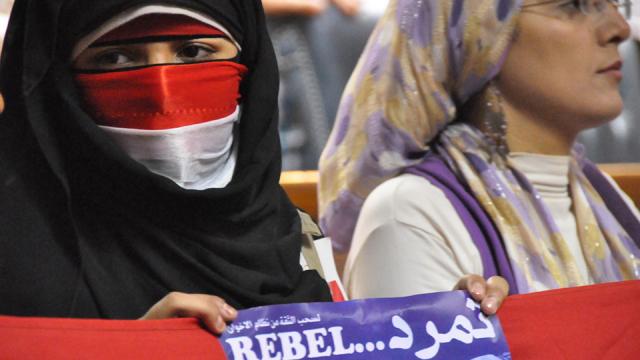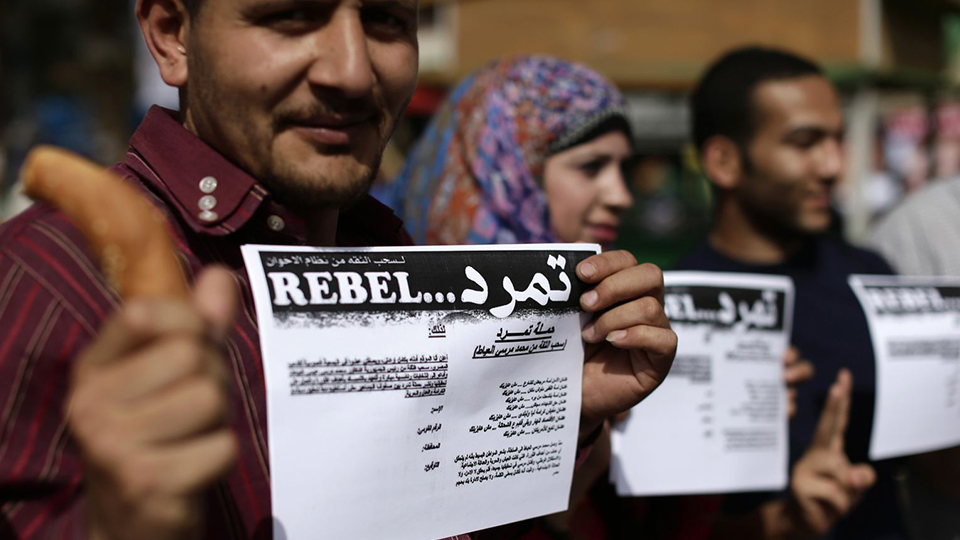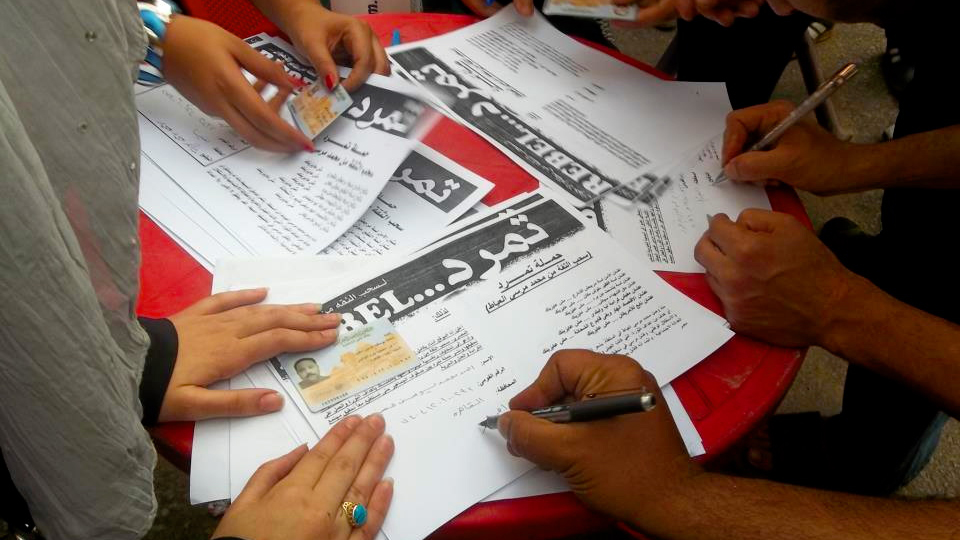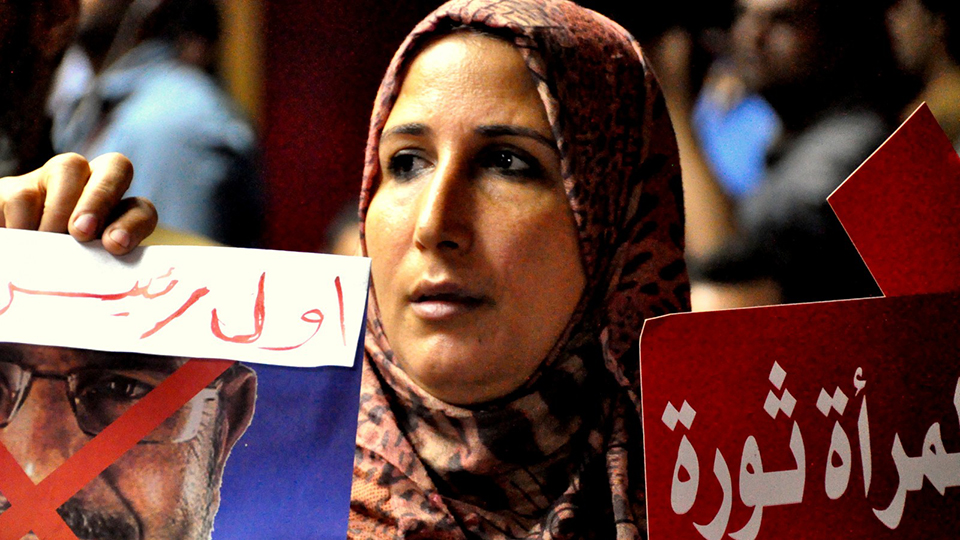
The crisis in Egypt hit its most recent peak last week following the death of 80 people as security forces attempted to break the sit-in by supporters of ousted President Mohamed Morsi. The deaths sparked more defiance among Morsi's backers, who vowed to stay amassed in public space until he is reinstated.
Media in Egypt estimates that 160 people have been killed in demonstrations and confrontations with security forces since June 28. Rising violence from both sides has cast a dark cloud on the much awaited reform process and people's hopes of regaining economic stability.
The newly appointed government is taking steps towards that reform, trying to continue on the path of the January 25, 2011 revolution. But the regime knows it is not working alone, and has been keen to take into account the youth that made such dramatic change this summer possible.
On June 30, millions of Egyptians took to the streets of Cairo and many other cities across the country, demanding that Morsi step down. The protesters accused him and the Muslim Brotherhood of ignoring the needs of the majority and promoting the interests of their Islamist group over the nation.
Quickly, the military delivered a 48-hour ultimatum to Morsi, threatening to intervene and impose a roadmap for the future if public demands were not addressed. Morsi was ousted by the military on July 3.
A New Movement Emerges
The group that organized and mobilized the nationwide protests is called Tamarod. The new, grassroots protest movement had sought to impeach Morsi through public actions and protests on the day Morsi took office one year previously. Now, after the successful protests it called — with the help of a petition it circulated, which garnered some 22 million signatures demanding Morsi's resignation — the group has stayed close to the circles of decision-makers, going to meetings and talking with the new interim cabinet.
Some days ago, Ahmed Abdo, a founding member and board member of the executive committee of Tamarod, spoke with Occupy.com about the movement’s new role. “We voted in majority two weeks ago, to move from a protest movement into a pressure movement, one that presents initiatives to the government,” said Abdo via telephone from Cairo.
Tamarod’s successful petition relied on the simplicity of the method and on-the-ground networking. Now, said Abdo, the group plans to use its street appeal and new political weight to become part of the reform process. It has already presented initiatives to the interim cabinet, beginning with its “Write your Constitution” campaign that gives citizens a chance to suggest what they wish to see in the currently drafted constitution.
But disappointment remains in the air. After interim President Adly Mansour announced the Islamic-made constitution would be reviewed and reformed, Tamarod and other groups voiced their opposition to the president's unilateral moves. Abdo said the group is in contact with the highest levels of government, including the presidency.
“We have direct lines to the prime minister, the vice president and Mr. Adly via our spokesperson Mahmoud Badr,” said Abdo, who acknowledged that the shift to democracy will not be an easy step in Egypt — and that listening to other parties is essential.
“There was a lot of fighting among the political powers in the meetings that we attended with national powers following the 30th of June. Some were very upset at some of the names brought forward by us, as in the case of nominating Dr. Mohamed ElBaradei to become prime minister,” Abdo said.
In particular, the Salafi (Islamic purist) al-Nour party and the Islamic Egypt the Strong party objected to ElBaradei becoming the head of the Cabinet. Instead, he was appointed vice president on foreign affairs. According to recent media reports, the Islamic parties in dialogue with the government also opposed Inas Abdel Dayem, the head of the Opera House in Cairo, from becoming minister of culture because she is a woman. The position was filled later by a man.
Tamarod remains confident that the street is on its side, after the campaign to impeach Morsi reached over 22 million signatures. Each petition holds the full name of the signer and his/her national ID number. It's difficult being part of the street, said Abdo, and not reacting to the ongoing violence.
“We condemned the violence and released statements calling for bloodshed to stop. We even reached out to the Muslim Brotherhood youth online and through the media. We called on them to go home and allow people to return to their homes,” he said.
Egyptian activists and the media have said there are some inside the Raba’a Square sit-in by Morsi backers who wish to return home, but fear retribution from fellow protesters if they dare to leave. The military has urged the pro-Morsi protesters to return home safely and promised to secure a safe exit for them. But rising tensions between the two camps is at an all-time high.
“There are people who are being deceived there. They are the ones who are dying," added Abdo. "[People at] these sit-ins have guns, we know that, but they refused to engage in a dialogue.” One of the initiatives Tamarod sought out was a removal of arms from the sit-ins to bring the violence to a halt.
“We presented the initiative to officials and it was approved by the president and the prime minister, but the Muslim Brotherhood refused and assaulted a number of rights groups’ representatives who visited the sit-in to start talks,” he said.
Another front Tamarod is working on is the military tribunals for civilians. The military tried 12,000 Egyptians during the 18 months it held power following the removal of former President Hosni Mubarak in February 2011, according to activists. Tamarod is demanding a retrial and a release of all civilians from behind military bars.
“We worked on a report with the help of activists Mona Seif and the No To Military Tribunals for Civilians group, and it was handed over to the president, the vice president and the prime minister about 10 days ago,” Abdo continued. Their demands, he said, are clear: “We want to end military trails for civilians, once and for all."
“This revolution is an extension of the January 25 revolution, the same one that called for freedom, social justice and dignity, and so far none of that came true. We are not asking for anything less."
Interestingly, Tunisia is now adopting the Tamarod name and model in an attempt to combat its own ruling Islamic Al Nahda party, which some activists accuse of hijacking the Tunisian revolution. Similar claims were raised against the Muslim Brotherhood in Egypt, and the Egyptian Tamarod has expressed pride that its actions in Cairo are inspiring Tunisians — and are even being launched softly across the region, reaching Bahrain, Syria and even Palestinians.
“Tamarod in Egypt is in solidarity with Tamarod in Tunisia, Bahrain, Syria and Palestine and in every country where there is a grassroots fight against religion merchants and social injustice,” said Abdo, adding that his group is “in contact with Tamarod in Tunisia” and willing to help their struggle any way possible.
The Tunisian Tamarod leader Mohammed Bannour told Tunisia Live news that their petition collected more than 180,000 signatures in two weeks, with a goal of reaching 2 million. On Tuesday, the country suspended its Constitutional Assembly, just weeks away from finishing its new draft Constitution, ahead of massive planned protests that are intended to dissolve the body.
Abdo said Egypt's Tamarod is hopeful now about the potential for political change, but it remains watchful about the outcome.
Its members know that it was their small meetings and talks that brought this movement to life and forced out a system viewed by many as unjust.
“When we set the date June 30 to be our day of action, I remember we told each other that if no one else shows up for the protest, it will just be us. All 25 [of us] at the time, we will go out and protest, and if we get killed, then others will go out and protest.”
3 WAYS TO SHOW YOUR SUPPORT
- Log in to post comments














